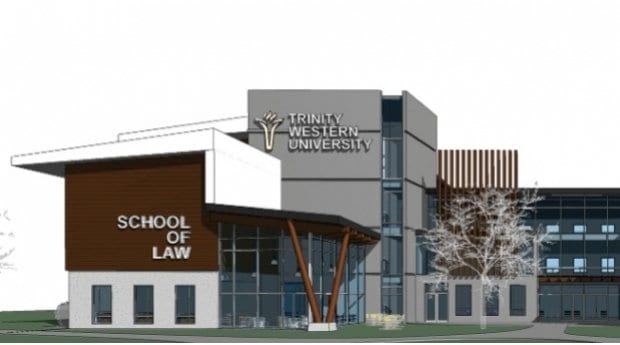The Law Society of BC (LSBC) is standing firm on its Oct 31 resolution to reject future graduates of Trinity Western University’s (TWU) proposed law school.
The controversy surrounding the school has spawned a spate of lawsuits, as law societies across Canada wrestle with TWU’s covenant, which requires students to abstain from sex outside heterosexual marriage.
The LSBC, for example, is now facing a lawsuit filed by TWU on Dec 18 in BC Supreme Court to challenge its refusal to recognize TWU graduates. TWU wants the court to order the law society to recognize the TWU faculty as an approved law school.
On Jan 16, the LSBC filed its response to that suit. “The resolution makes it clear that the legal profession of BC does not condone and will not facilitate the exclusion of lesbian, gay and bisexual (LGB) people from the practice of law,” the society response says.
“Where LGB persons would be denied equal access to the privilege of a legal education and the benefits it confers on the basis of sexual orientation, the law society has the statutory and constitutional obligation to deny its approval of the proposed law school,” the response adds.
The LSBC response also refers to a footnote to the TWU covenant that, it says, refers to a biblical passage “denouncing same-sex intimacy as ‘vile,’ ‘against nature,’ and ‘unseemly.’”
TWU’s petition to the court says the LSBC has no authority under the provincial Legal Profession Act to refuse graduates who meet the act’s primary objective, which is assuring the competence of lawyers in the public interest. The society’s response says its actions are not meant to punish TWU or those who want to attend a law school rooted in spiritual values.
“Rather,” the response says, “it has been done to advise TWU, its prospective students and the government in advance of TWU granting any law degrees, that the Law Society does not consider it to be in the public interest in the administration of justice for prospective graduates of a law school that discriminates in its admission policy to be enrolled in the law society’s admission program.”
The society stressed it has no power to control what happens at TWU nor what lawyers believe. “Evangelical Christians, including those who believe same-sex intimacy is sinful, are welcome at every law school in British Columbia and across Canada and make a valuable contribution to the diversity of the legal profession,” the response says.
The society says it has not only the statutory power to refuse TWU graduates, but also an obligation to do so if it deems the school not in the public interest under the provincial Legal Profession Act.
The LSBC had approved the school in April, but after an outcry from its members and two votes, including a referendum, the society reversed that approval on Oct 31.
The response acknowledges that the LSBC can deny approval for admission to the practice, but it cannot stop TWU from granting law degrees. “This power lies with the provincial government and the minister of advance education under the Degree Authorization Act,” the response says.
BC’s Ministry of Advanced Education rescinded its approval for the school on Dec 11, facing a lawsuit from a prospective gay law student, as pending lawsuits in Nova Scotia and Ontario made their way through the courts.
The ministry had approved the proposed Christian law school on Dec 18, 2013, two days after the Federation of Law Societies of Canada approved it. The ministry later said its approval had been conditional on TWU enrolling students within three years.
The LSBC response notes that TWU has not legally challenged the ministry’s decision to revoke its support.
TWU officials could not be immediately contacted for comment.

 Why you can trust Xtra
Why you can trust Xtra


